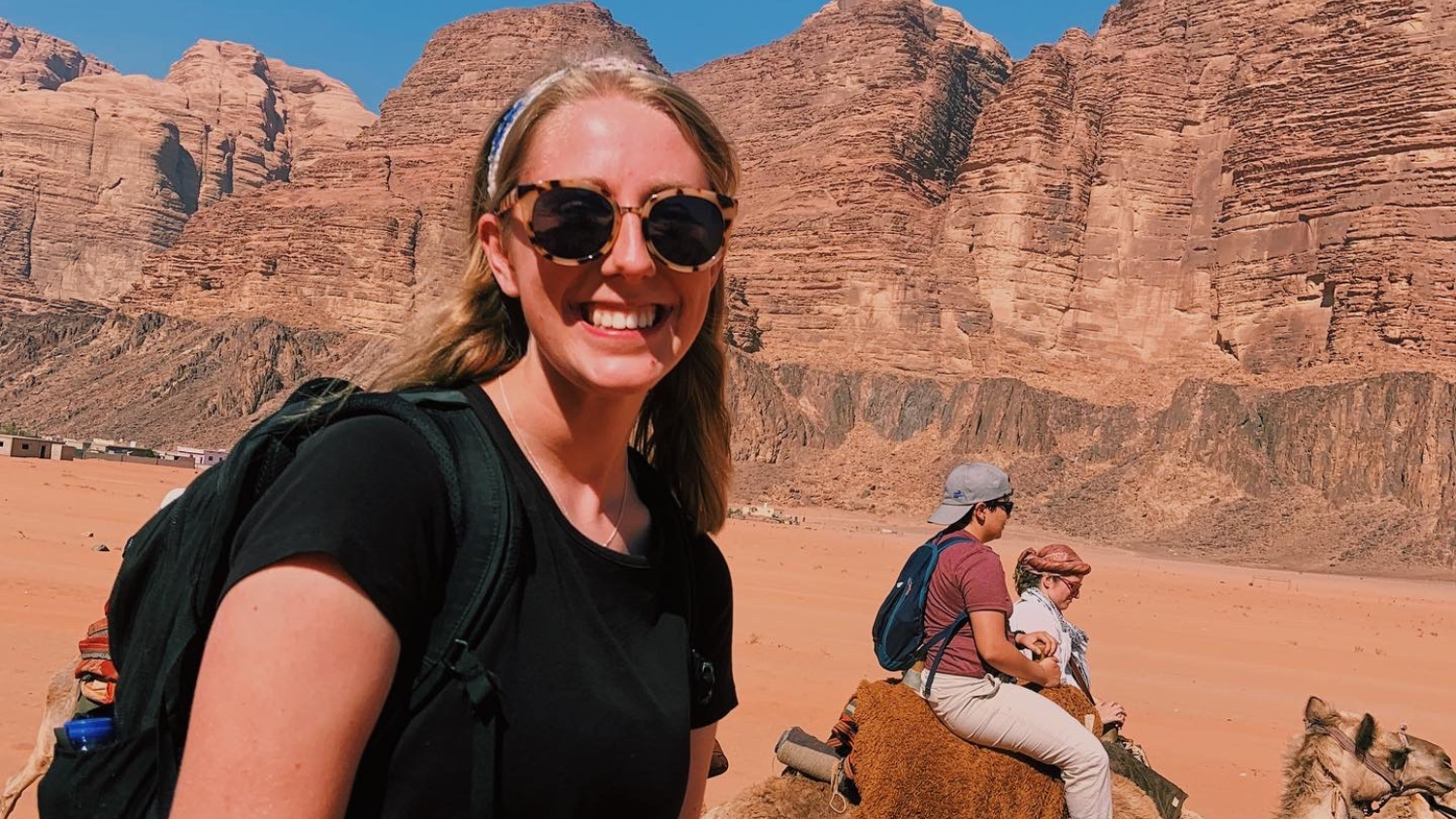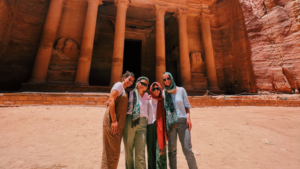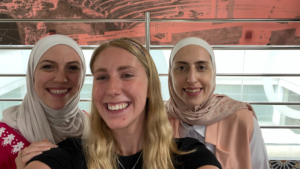Meet Grace Feichter

Program and Location:
Summer, Qasid Arabic Institute; Amman, Jordan
Major/Minor:
Double major in political science and Arabic Language and Literature
Why did you choose to study abroad?
I chose to study abroad to enhance my understanding of the world. Though learning a new language is an incredibly beautiful experience, it is the personal and cultural connections that make it so worthwhile. Spending a summer in Amman, Jordan was unlike anything I’ve ever done before. Learning complex vocabulary and grammar concepts in Arabic from a professor that speaks Arabic was incredibly complex, though it made me even more sure that Arabic is where my true passion lies.

What did you learn about yourself?
Summer 2022 was a period of self-discovery, one that required great resilience and determination to endure. I didn’t know I was capable of so much growth in such a short period of time. I believe the greatest lesson I learned was that of “we can do hard things.” Of course, I knew that I was capable of so much before spending the summer in Jordan, but my experience affirmed that I am strong and capable of persevering, even in the face of great hardship. I feel that I was able to return to the United States with greater clarity and direction for my passions, as well as a more comprehensive understanding of the world around me.
What was one of your favorite parts of your program?
Though there were many precious moments from my trip, perhaps my most favorite was weekend I spent in the desert of Wadi Rum with my dearest friends. The views while hiking were absolutely breathtaking and I remember laughing until my stomach hurt as my group cheered on our jeep driver to pass the surrounding cars, flying over bumps and branches, though it was all in good fun. After watching an absolutely stunning sunset while enjoying tea and sweets, we drove to the Bedouin camp where we would be staying for the night. During our time away, a meal had been prepared using the traditional zarb, an underground oven upon which hot coals are placed and then buried under the sand and left alone for several hours. The hospitality was unlike anything I’ve ever experienced before and I felt to thankful to be there in that moment, surrounded by so many people I loved. After dinner, we ventured out to the campfire and consumed cup after cup of sage tea (in Arabic:شاي مريمية) while listening to the soft sound of the ‘Oud and the crackle of the fire. The Bedouin family we were staying with wanted to take us further into the desert, away from the soft flowing light of the camp into true darkness, so that we could see the stars in all of their beauty. My friends and I took refuge in the sand and gazed up in wonder at the night sky. It was as if you could see the whole galaxy from this one place on earth. After we returned back to our place of rest, many chose to bring their mattresses out from the structures to sleep under the stars (a truly once-in-a-lifetime experience), only to be woken up a few hours later by the bright light of the morning sun.

How were your classes abroad different than if you would have taken them at NC State? Did you take any field trips or do anything outside of the traditional classroom?
My classes in Jordan were much different than the ones that I had taken before in the United States. In my classes at Qasid Arabic Institute, I was required to speak only Arabic for the entirety of class session. I attended class five days a week for four hours per day and in doing so, watched my communication and learning abilities transform over the course of two months. I was able to connect so deeply with my professor because I was speaking her native language, which allowed for a greater understanding of one another. She even taught me how to do the traditional Palestinian embroidery work “tatreez” (in Arabic: تطريز) in Arabic and we would practice together before and after our classes. Additionally, I learned Arabic vocabulary related to the places I was visiting on my school trips. My instructors that were chaperoning the trip provided a list to us and we were expected to use the terms in relation to the sights we saw or the people we met, which was really cool. Learning Arabic in the US is mostly textbook based, but being able to actively engage in the cultural component on a day-to-day basis truly enhanced the learning experience.
In what ways did your identity have an impact on your experience abroad?
I identify as bisexual and am in a relationship with a woman. During my time studying abroad, I was quite nervous about sharing my sexuality with the people that I met along my journey. In certain instances, I refrained from mentioning aspects of my relationship at all because I was so worried that someone would judge me for who I am and who I’m in a relationship with. While it is true that you must carefully evaluate who you choose to share this information with, my friends that I met in Jordan were largely accepting of and embraced my sexuality with open arms. They were excited to see my pictures from Pride events in the states and wanted to know more about what my life looked like here. My identity as a bisexual woman certainly made me more conscious of what it was like to be queer in the Middle East. What I found most challenging to come to terms with, however, was the fact that I only had to endure the feeling of having to “hide myself” for a summer, though there are people that face threats of being outcast by their family or society. This semester, in my Modern Arab Popular Culture Class with Dr. Saylor, I was made aware of the intersections between being Palestinian and identifying as queer. They face significant forms of oppression on both fronts and the struggle to be authentic to oneself and one’s identity becomes exorbitantly challenging. There are people that are paving the way for people experiencing these struggles, such as Bashar Murad, a queer Palestinian artist that seeks to creating lasting, impactful social change within the region.
What advice do you have to future study abroad students?
My advice to future study abroad students is to hold each moment close to your heart and truly focus on being present. Prior to studying abroad, I was incredibly concerned with finishing every assignment and turning it in only if it was absolutely perfect. In Jordan, I had so much homework on a daily basis that it became impossible to do it all. This is the teaching method of the institute that I studied at, to ensure that students are able to learn how to prioritize that which they really need to study. My professor, an alum of the study abroad program in which I participated, knew me well as a student and encouraged me to, of course, prioritize my studies while I was there but also embrace each and every opportunity outside of class, because it is these elements in conjunction that make the study abroad experience so impactful. This was the single greatest piece of advice I received prior to my departure this summer and I truly feel that this is why my experience turned out the way it did. Remember the importance of external cultural exchanges to your learning.
Would you do it again?
Of course. While the program I was enrolled in was incredibly demanding, I learned so much, more than I would ever be able to studying in the United States.